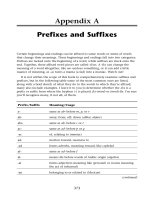Using Prefixes and Suffixes
Bạn đang xem bản rút gọn của tài liệu. Xem và tải ngay bản đầy đủ của tài liệu tại đây (165.46 KB, 22 trang )
W
hen you come across unfamiliar words without context,
breaking those words into their parts can help you determine
their meaning. This lesson reviews prefixes and suffixes and how you can
use them to add new words to your vocabulary—and better understand
words you already know. Before you begin learning and reviewing pre-
fixes and suffixes, take a few minutes to take this ten-question Benchmark
Quiz. These questions are similar to the type of questions that you will
find on important tests. When you are finished, check the answer key
carefully to assess your results. Your Benchmark Quiz analysis will help
you determine how much time you need to spend on prefixes and suffixes
as well as the specific words you need to learn in order to increase your
vocabulary power. A complete list of the vocabulary words used in this
lesson is provided at the end of this chapter.
BENCHMARK QUIZ
Choose the best answer to each question using your knowledge of prefixes
and suffixes.
Using Prefixes
and Suffixes
3
38
USING PREFIXES AND SUFFIXES
39
1. Antecedent means:
a. fighting against.
b. looking after.
c. coming before.
d. under the authority of.
e. recent.
2. Multifaceted means:
a. two-faced.
b. many sided.
c. uniform.
d. cut into parts.
e. chaotic.
3. Circumspect means:
a. relating to the circus.
b. to examine thoroughly.
c. put forth in writing.
d. in an uncomfortable position.
e. looking around carefully.
4. Consensus means:
a. general agreement by a group.
b. an individual opinion.
c. a counting of individuals.
d. to issue a warning.
e. separate and dissimilar.
5. Supercilious means:
a. less than the norm, disappointing.
b. exactly as expected.
c. speaking in a measured, exact tone.
d. haughty, with an air of superiority.
e. achieving what one intended to achieve.
6. To presage means:
a. to warn in advance.
b. to send a message.
c. to pressure.
d. to age gracefully.
e. to be slow to realize.
JUST IN TIME VOCABULARY
40
7. Dubious means:
a. one who doubts, a non-believer.
b. to doubt or question.
c. doubtful, questionable.
d. to be uncertain.
e. uncertainty, doubt.
8. Agrarian means:
a. incapable of making a decision.
b. to cultivate.
c. to be out of date.
d. relating to land or land ownership.
e. the process of testing for impurities.
9. Parity means:
a. to make equal in status, amount, or degree.
b. the state of being equal in status, amount, or degree.
c. one who is equal in status, amount, or degree.
d. the act of making someone or something equal in status, amount,
or degree.
e. to cause to become equal in status, amount, or degree.
10. Galvanize means:
a. to be active or aware.
b. the state of becoming active or aware.
c. one who becomes active or aware.
d. the act of making someone or something become active or aware.
e. to cause to become active or aware.
BENCHMARK QUIZ SOLUTIONS
How did you do on remembering prefixes and suffixes? Check your answers
here, and then analyze the results to figure out your plan of attack for mas-
tering these topics.
◗
Answers
1. c. The prefix ante- means before. Antecedent means that which pre-
cedes; the thing, circumstance, or event that came before.
USING PREFIXES AND SUFFIXES
41
2. b. The prefix multi- means many. Multifaceted means having many
facets or aspects; complex.
3. e. The prefix circum- means around, on all sides. Circumspect means
cautious, wary, watchful.
4. a. The prefix con- means with, together. Consensus means general
agreement or accord; an opinion or position reached by a group.
5. d. The prefix super- means above, over, or exceeding. Supercilious
means with an air of superiority (as if one is above or better than
another); haughty, scornful, disdainful.
6. a. The prefix pre- means before. To presage means to indicate or
warn of in advance; to predict, foretell.
7. c. The adjective suffix -ous means having the quality of, relating to.
Dubious means doubtful, questionable; fraught with uncertainty,
wavering.
8. d. The adjective suffix -ian means one who is or does, related to.
Agrarian means relating to or concerning land and its ownership
or cultivation.
9. b. The noun suffix -ity means state of being. Parity means having
equality in status, amount, value or degree; equivalence.
10. e. The verb suffix -ize means to cause, to bring about. To galvanize
means to stimulate or rouse into awareness or action.
BENCHMARK QUIZ RESULTS
If you answered 8–10 questions correctly, well done! You are already skilled
at using prefixes and suffixes to determine meaning. Give the lesson a quick
review and do the practice exercise. If your score on the practice test is
equally high, move on to Chapter 4.
If you answered 4–7 questions correctly, you are familiar with some of
the most common prefixes and suffixes and how to use them to determine
meaning. But you need more practice to really sharpen this skill. Be sure to
set aside some time to carefully review the complete list of common prefixes
and suffixes located in Appendix A.
If you answered 1–3 questions correctly, perhaps it has been a while since
JUST IN TIME VOCABULARY
42
you reviewed prefixes and suffixes, or perhaps English is not your primary
language. Study the lesson that follows carefully, and do the practice quiz
on a separate sheet of paper so that you can do the exercise several times if
necessary. Take extra time to learn the complete list of common prefixes and
suffixes located in Appendix A.
JUST IN TIME LESSON—PREFIXES AND SUFFIXES
A good knowledge of prefixes and suffixes is essential to building an effec-
tive vocabulary. The more familiar you are with these fundamental word
parts, the easier it will be to determine the meaning of unfamiliar words.
There are dozens of prefixes and suffixes in the English language. The
good news is that you probably already know a majority of them and use
them every day without even thinking about it. This lesson will review some
of the most common prefixes and suffixes so that you can use them to
understand the meaning of new vocabulary words.
IF ENGLISH IS NOT YOUR PRIMARY LANGUAGE
Learning prefixes and suffixes in another language may seem like a daunt-
ing task, but the job may be easier than you think. Though prefixes and suf-
fixes often appear in books like this with sophisticated vocabulary words,
you are already using the same prefixes and suffixes with simple words that
you already know well. In the prefix and suffix lists, both in this chapter and
in the appendix, everyday examples have been provided for you, rather than
the kind of vocabulary words you are likely to see on an exam. This will help
you more easily memorize the prefix and suffix meanings.
PREFIXES
Prefixes are syllables attached to the beginning of words to change or add to the
meaning of the root word in some way. For example, the word prefix itself uses
the prefix pre-, meaning before. Thus the meaning of the root word, fix, changes:
fix: to place securely or firmly
prefix: something placed at the beginning of a word
Several of the vocabulary words you studied in Chapter 2 used prefixes,
including incontrovertible and inept, which both use the prefix in-, meaning
not—not disputable and not suitable or competent.
USING PREFIXES AND SUFFIXES
43
Knowledge of prefixes can help you in many ways as you build your vocab-
ulary and as you take your exam. Although you can’t determine meaning based
on a prefix alone—you also need to know the root of the word—you can often
use a prefix to determine whether a word is positive or negative, to eliminate
incorrect answers, and to provide partial context for the meaning of the word.
For example, take the word polyglot. If you know that the prefix poly- means
many, you can eliminate all but the correct answer in the question below:
A polyglot is:
a. someone who is an expert in global issues.
b. someone who administers lie detector tests.
c. someone who is easily frightened.
d. someone who speaks many languages.
e. someone who travels.
Choice d is the only answer that includes the idea of many or multiple.
Thus, it is the only possible correct answer.
GLOSSARY
ROOT
the main part of a word; the base upon which prefixes and suffixes are added
PREFIX
syllable(s) attached to the beginning of a word to change or add to its meaning
SUFFIX
syllable(s) attached to the end of a word to change or add to its meaning
You will not always be so lucky as to eliminate all of the incorrect
answers, but even eliminating two or three will be a great help. For exam-
ple, knowing that the prefix mal- means bad, evil, or wrong can help you
significantly narrow down your choices in the following question:
To malign means:
a. to arrange.
b. to speak badly about.
c. to charm, enchant.
d. to cast an evil spell.
e. to flatter.
With your knowledge of prefixes, you can eliminate choices a, c, and e,
leaving you with a 50-50 chance of choosing the correct answer. If you
recall any context in which you have heard the word malign before, you may
be able to choose the correct answer, b. To malign is to say evil, harmful, and
often untrue things about someone; to speak ill of.
Below you will find a list of the prefixes for the vocabulary words in this
lesson. For each prefix, we have provided two examples of words that use
that prefix. With a few exceptions, these examples are not test-prep words;
JUST IN TIME VOCABULARY
44
rather, they are basic words that are probably already part of your vocabu-
lary. This will help you remember the meaning of each prefix—and show
you just how well you already know them.
a, an: not, without
amoral (not moral), atypical (not typical)
ab, abs: from, away, off
abduct (to take by force), abnormal (away from or apart from the
standard)
ante: prior to, in front of, before
anterior (placed before), antedate (to proceed in time, come before)
anti, ant: opposite, opposing, against
antibiotic (substance that kills microorganisms), antidote (remedy for
counteracting the effects of a poison),
circ, circum: around, about, on all sides
circumference (the outer boundary of a circle), circumstance (the condi-
tions or state of affairs surrounding or affecting an event; a particular
incident or occurrence)
co, com, con: with, together, jointly
cooperate (to work together, comply), connect (to bind or fasten together)
dis: away from, apart, reversal, not
dismiss (to send away from, eject), disobedient (not obedient)
ex: out, out of, away from
exit (go out), expel (to drive out or away)
in: not
inaccurate (not accurate), informal (not formal)
inter: between, among, within
intercept (to stop someone or something between its starting point
and destination), intervene (to come, occur, appear, or lie between
two points of time or things)
mal: bad, abnormal, evil, wrong
malfunction (to fail to function properly), malpractice (wrongdoing,
especially improper or negligent treatment of a patient by a physician)
mis: bad, wrong, ill; opposite or lack of
misbehave (to behave badly), misspell (to spell incorrectly)
multi: many, multiple
multimedia (the combined use of several media), multiple (having
several or many parts or elements)
neo: new, recent, a new form of
neonatal (of or relating to a newborn child), neologism (a new word
or phrase)
non: not
nonfiction (the genre of literature that includes all types of books
other than fiction), nonsmoker (someone who does not smoke)
USING PREFIXES AND SUFFIXES
45
poly: many, much
polygamy (the system of having more than one wife at a time), poly-
syllabic (having three or more syllables)
pre: before
precaution (something done in advance to avoid risk), predict (to fore-
cast, make known in advance)
re: back, again
rebuild (to build again after destruction), replace (to put back in its
former position; to take the place of)
sub: under, beneath, below
subdue (to overcome, bring under control), submarine (a ship that
can operate under water)
super: above, over, exceeding
superb (grand, magnificent, of unusually high quality, excellent),
superman (a man with powers exceeding ordinary human capacity)
uni: one
unify (to form into a single unit, unite), unite (to join together, make
or become one)
A more comprehensive list of the most common English prefixes is
located in Appendix A. After you have completed this lesson, make sure you
review the list carefully and study any prefixes that are unfamiliar to you.
SOUNDS LIKE . . .
As you use your knowledge of prefixes and suffixes to determine meaning,
see if you can recall hearing or using any words with similar roots or sounds.
For example, when you were taking the Benchmark Quiz, you may have
realized that agrarian sounds like it shares a root word with agriculture—and
it does. Even if you don’t know exactly what agriculture means, you might
know that it has something to do with land and its cultivation. Thus you
would have been able to more quickly narrow down the answer choices to
b (to cultivate) and d (relating to land or land ownership). Once you real-
ize that the suffix -ian calls for an adjective, not a verb, then you can elim-
inate b and choose the correct answer, d.
SUFFIXES
Suffixes are syllables added to the end of words to change or add to their
meaning. They often change a word’s part of speech, thereby also chang-
ing how the word functions in a sentence. Suffixes tell you whether a word









